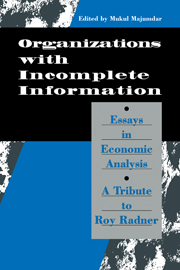Book contents
- Frontmatter
- Contents
- List of Contributors
- Preface
- Introduction: Searching for Paradigms
- 1 Equilibrium with Incomplete Markets in a Sequence Economy
- 2 The Existence of Rational Expectations Equilibrium: A Retrospective
- 3 Rational Expectations and Rational Learning
- 4 Dynamic Games in Organization Theory
- 5 The Equilibrium Existence Problem in General Markovian Games
- 6 A Practical Person's Guide to Mechanism Selection: Some Lessons from Experimental Economics
- 7 Organizations with an Endogenous Number of Information Processing Agents
- 8 A Modular Network Model of Bounded Rationality
- Index
3 - Rational Expectations and Rational Learning
Published online by Cambridge University Press: 09 October 2009
- Frontmatter
- Contents
- List of Contributors
- Preface
- Introduction: Searching for Paradigms
- 1 Equilibrium with Incomplete Markets in a Sequence Economy
- 2 The Existence of Rational Expectations Equilibrium: A Retrospective
- 3 Rational Expectations and Rational Learning
- 4 Dynamic Games in Organization Theory
- 5 The Equilibrium Existence Problem in General Markovian Games
- 6 A Practical Person's Guide to Mechanism Selection: Some Lessons from Experimental Economics
- 7 Organizations with an Endogenous Number of Information Processing Agents
- 8 A Modular Network Model of Bounded Rationality
- Index
Summary
Introduction
The issue of expectation formation arises naturally in economies with a sequence of spot and incomplete futures markets. In such economies, individuals use forecasts of future prices in order to make decisions about current consumption and investment. Equilibria in the markets for current consumption and currently available futures contracts may exist even if individuals have differing and incorrect expectations. Such equilibria are called temporary equilibria, and other than the usual conditions on preferences and endowments, their existence requires only weak conditions on expectations about future prices. However, absent any structure on price expectations, there is little more to be said about equilibria at any date.
One attempt to tie down expectations is the rational expectations hypothesis: that individuals hold common, correct price expectations in economies with incomplete markets. The existence of rational expectations equilibria was first addressed by Roy Radner in his seminal 1972 paper on plans, prices, and price expectations. Radner fixed expectations by requiring that agents hold common price expectations and that their plans be consistent with market clearing at all future dates at prices equal to their expected prices. The term “self-fulfilling” has been used to describe these “rational” expectations. It is particularly apt because it emphasizes that the actual sequence of prices is determined by the expectations agents use.
In the 1972 model, payoff-relevant information was distributed “symmetrically”; that is, all traders had the same information. Consequently there is nothing to be learned from other traders, and so in equilibrium there is nothing to be inferred from current prices about prices in the future.
Information
- Type
- Chapter
- Information
- Organization with Incomplete InformationEssays in Economic Analysis: A Tribute to Roy Radner, pp. 61 - 109Publisher: Cambridge University PressPrint publication year: 1998
Accessibility standard: Unknown
Why this information is here
This section outlines the accessibility features of this content - including support for screen readers, full keyboard navigation and high-contrast display options. This may not be relevant for you.Accessibility Information
- 18
- Cited by
